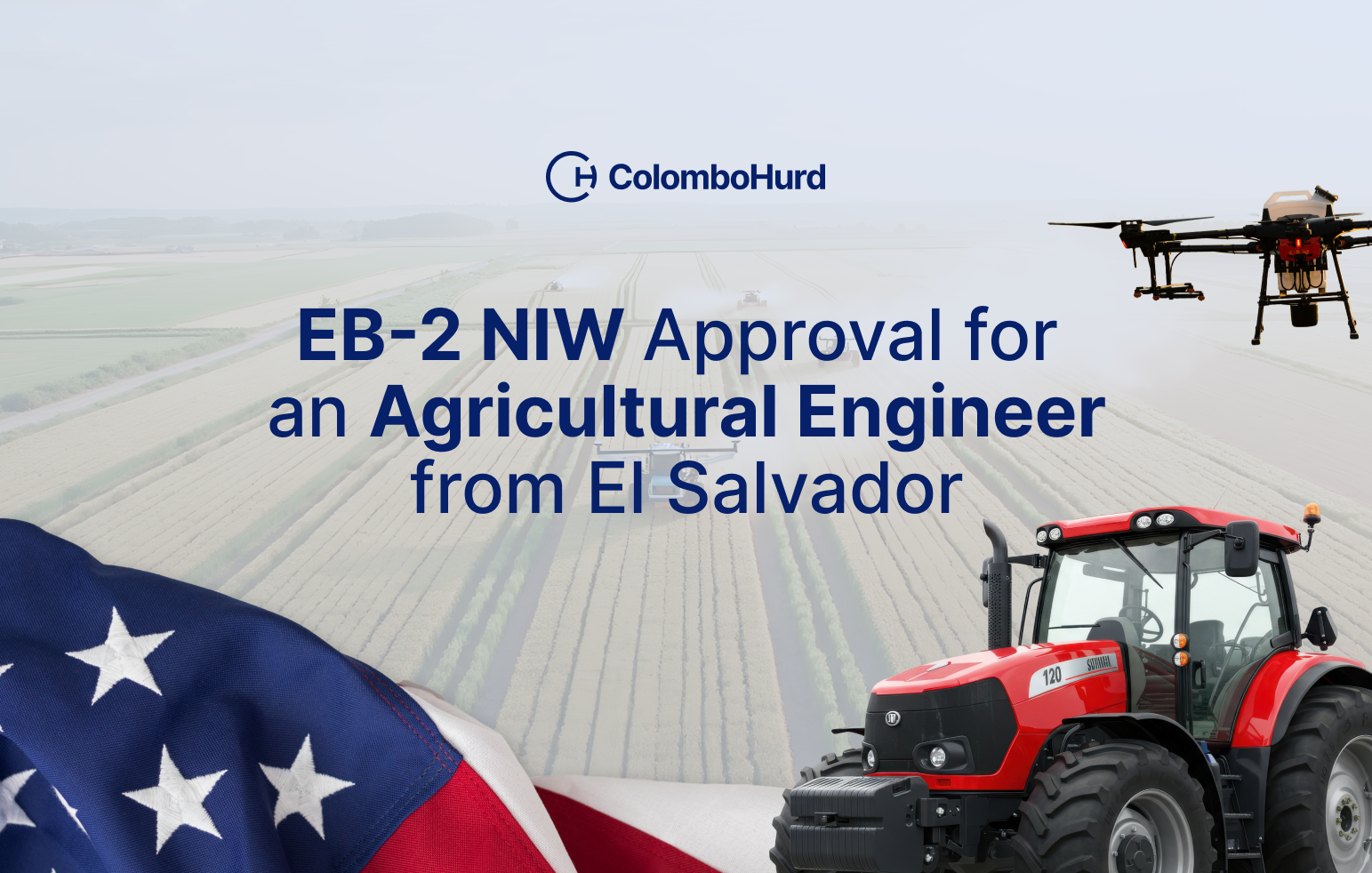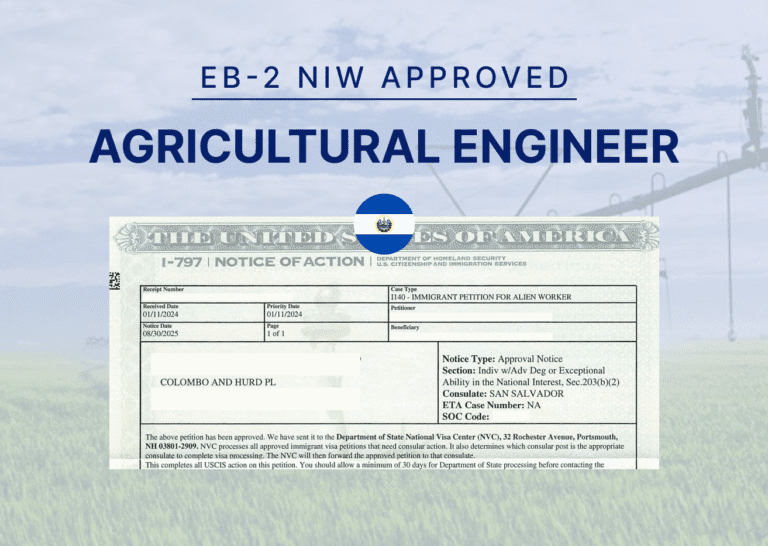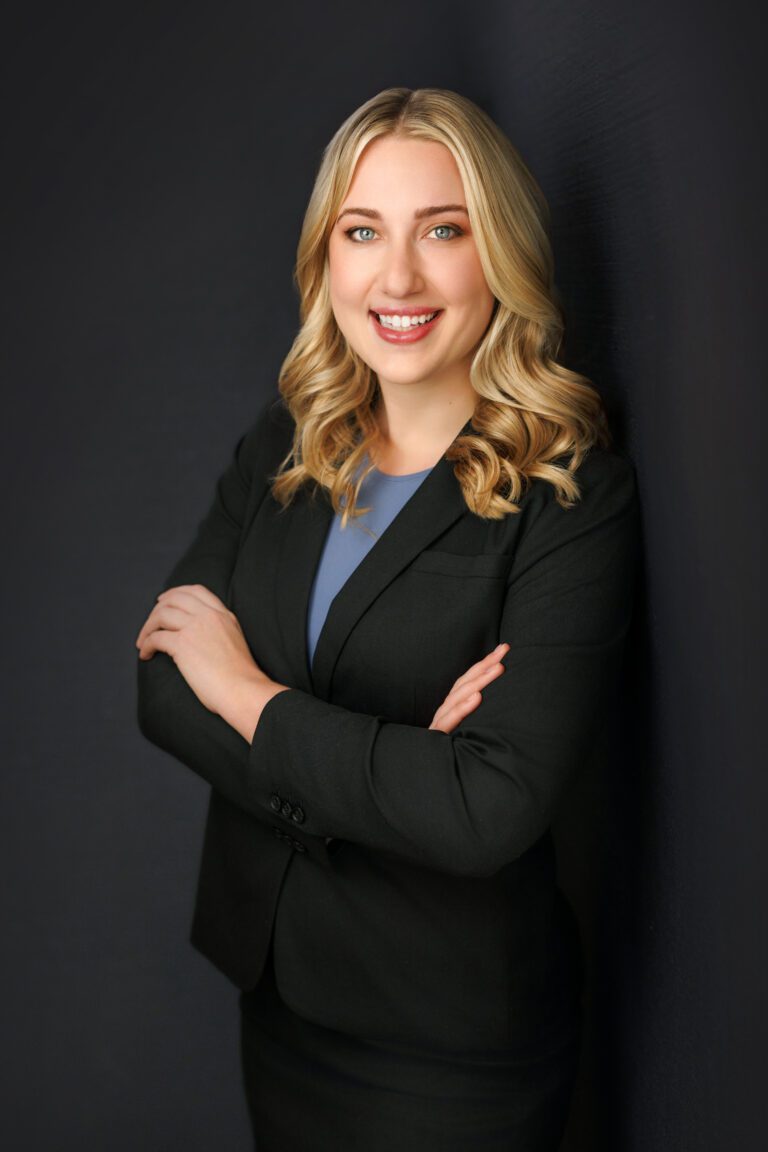Agricultural Engineer
Food insecurity remains a serious problem in the United States. In 2023, more than 47 million people lived in households struggling to access enough food, including nearly 14 million children. Families with children were hit the hardest, with almost one in five experiencing food insecurity.
On August 30, 2025, Colombo & Hurd secured an EB-2 National Interest Waiver (NIW) approval for a distinguished agricultural engineer from El Salvador. His work develops solutions that can be applied widely to directly support national food security priorities.
Guided by Colombo & Hurd’s legal team, the approval recognized the pressing nature of our client’s mission and his potential to strengthen U.S. food systems. He created a hands-on training program that helps farmers and communities reduce import dependency, strengthen local production, and promote healthier diets.

An Agricultural Engineer Dedicated to Sustainable Farming and Food Security
Dedicated to improving agriculture, our client has built a career focused on creating solutions that make farming both more productive and more sustainable. With a bachelor’s degree in Agricultural Engineering and 18 years of professional experience, he specializes in sustainable farming and crop cultivation. Over the years, he has introduced innovative practices that increase yields while reducing the use of harmful agrochemicals. His combination of technical expertise and innovative methods has positioned him as a respected voice in sustainable farming.
Our client’s proposed endeavor in the United States is both urgent and practical. He seeks to reduce the nation’s dependence on imported vegetables and legumes while ensuring that food grown domestically is healthier and safer for consumers.
To achieve this goal, he has created an integrated production model. This model combines sustainable cultivation methods, hands-on training in non-native crop production, and the establishment of experimental fields to prepare future farmers. Through this approach, he aims to advance food sovereignty, healthier diets, and long-term economic savings for American households.
Pursuing Innovation Without Sponsorship Barriers
When our client first approached Colombo & Hurd, he faced a significant obstacle. He wanted to bring his expertise to the United States to strengthen the agricultural sector and expand his career. Yet, traditional immigration pathways were not a viable solution. Employer-sponsored visas would have restricted his independence, limiting his ability to carry out innovative projects that required flexibility and self-direction.
As a result, the challenge was clear: we needed to demonstrate the national importance of his proposed endeavor and show that his background positioned him to make a meaningful impact in the United States. While his expertise was undeniable, the task lay in connecting his vision to critical national priorities such as food security, public health, and sustainable agriculture.
Building the Case for Sustainable Agriculture in the U.S.
Colombo & Hurd’s legal team approached the case with a clear vision: highlight his career in a way that directly addressed America’s needs. The United States is confronting food insecurity, heavy import reliance, and growing concerns about sustainability. His work, improving crop production, promoting healthier food, and training future farmers, fits directly into these urgent needs.
Our team framed his vision within ongoing national initiatives. His model aligned with efforts like the White House Conference on Hunger, Nutrition, and Health and USDA programs supporting specialty crops. This connection showed that his work would build on priorities already recognized at the highest levels.
For almost two decades, he had introduced pest-resistant crops, created organic fertilizers, and developed cost-saving farming techniques. These innovations weren’t theoretical; they had already improved farming practices and livelihoods.
Moreover, he presented a roadmap that included training programs, experimental fields for communities, and collaborations with universities and agencies. This demonstrated that his impact in the U.S. would be practical, immediate, and lasting.
Attorney Allison McVey, a dedicated immigration attorney at Colombo & Hurd specializing in employment-based petitions, explained: “Agricultural engineering endeavors like our clients are essential to supporting U.S. food systems resilience and national security. By creating this innovative, integrated production model, the U.S. can mitigate risks like supply shortages or price spikes, ensuring that food remains available and affordable during times of crisis.”
The legal team also placed his work in a broader context. The U.S. is experiencing a shortage of agricultural engineers, with demand expected to rise over the next decade. His expertise would not replace American workers but instead fill a critical gap while helping advance food security. Through this narrative, we positioned him as a successful agricultural engineer and as a professional ready to help shape the future of American farming.
See if you qualify
Get your free EB-2 NIW visa profile evaluation today.
Advancing Food Security Through Immigration
On August 30, 2025, USCIS approved the client’s EB-2 National Interest Waiver petition. The approval opens doors for collaboration with government agencies, universities, and private organizations, allowing his innovative work to benefit farmers, communities, and future generations. His work in the U.S. strengthens farming communities and ensures families have reliable access to healthy food.
As Attorney Allison McVey explained, supporting small-scale, regional food producers can help stabilize prices and make food more affordable for American consumers. She emphasized that this kind of resilience fosters innovation in food production and enhances food safety and nutritional quality, ensuring that Americans have reliable access to safe, nutritious, and affordable food, even in times of uncertainty.
If you’d like to explore whether an EB-2 NIW could support your own professional goals, we offer a free evaluation here.
“Agricultural engineering endeavors like our client’s are essential to supporting U.S. food systems resilience and national security. By creating this innovative, integrated production model, the U.S. can mitigate risks like supply shortages or price spikes, ensuring that food remains available and affordable during times of crisis.”


